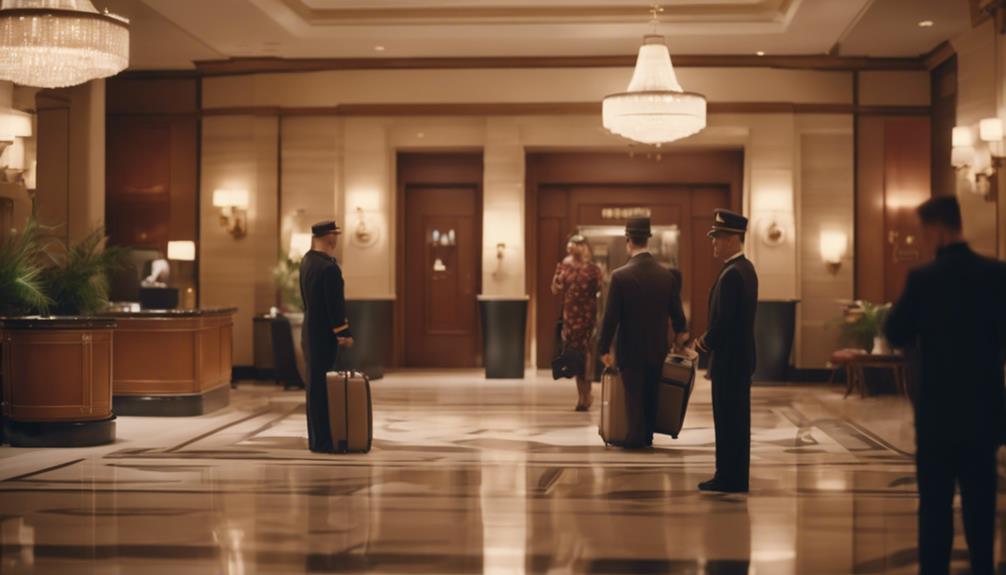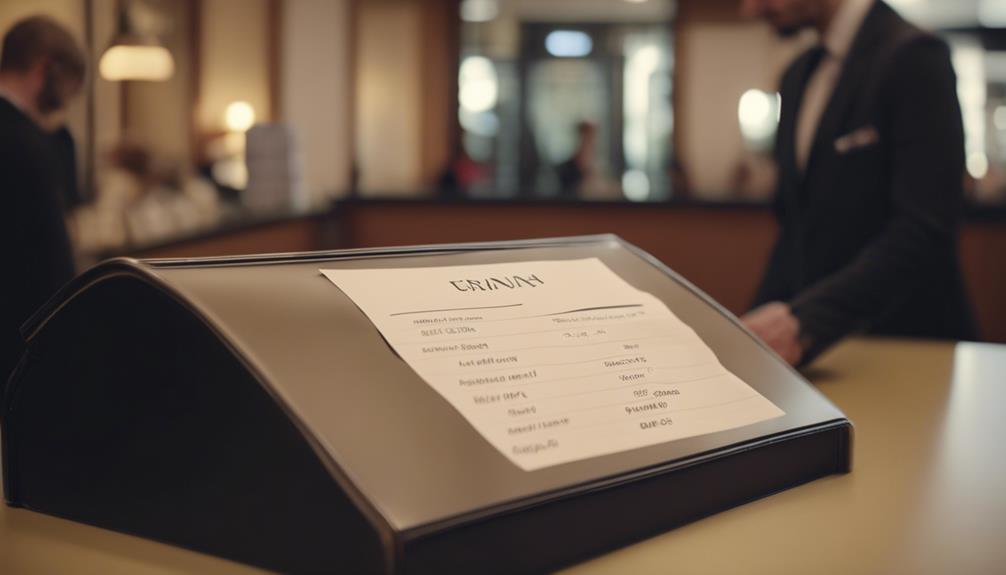Porterage fees are a hidden cost in the hospitality industry, typically averaging around $25. These charges allow hotels to compensate their staff for transporting luggage to guest rooms. While viewed as a one-time expense, they may also appear in group bookings, contributing to the overall cost of a stay. Such unexpected fees can lead to guest frustration and dissatisfaction, impacting the hotel's reputation. Transparency in pricing is essential to fostering customer trust. Understanding porterage fees can help travelers budget more effectively for their trips, guiding them to make informed choices regarding accommodation expenses.
Key Takeaways
- Porterage fees, averaging around $25, are charges for transporting luggage to guest rooms in hotels.
- These fees compensate hotel staff, including bellhops and doormen, for their services.
- Often considered a one-time fee, porterage may be included in group bookings.
- Unexpected porterage fees can lead to customer dissatisfaction and mistrust during check-out.
Understanding Porterage Fees

Porterage fees are charges levied by hotels for the transport of luggage to guest rooms, typically applied in larger establishments and often amounting to around $25.
These fees serve to compensate hotel staff, such as bellhops or doormen, who assist guests with their luggage upon arrival and departure.
While generally considered a one-time fee, porterage charges can sometimes be included automatically in group bookings, regardless of whether the service is utilized.
It is important to note that the fee does not depend on the actual use of the bellboy or doorman services, but rather reflects the hotel's operational policies.
Guests should be aware of these fees to better understand their total accommodation costs.
Overview of Additional Hotel Fees

Hotels frequently impose various additional fees beyond the standard room rate, which can include charges for amenities and services such as resort access, early check-in, and Wi-Fi.
These extra costs can greatly impact the overall price of a stay and may surprise guests upon checkout.
Common additional fees include:
- Resort Fees: Daily charges for amenities like pools, fitness centers, and activities.
- Early Check-In Fees: Costs incurred for checking in before the standard time.
- Wi-Fi Charges: Fees for internet access, often at a daily rate.
- Extra Guest Fees: Additional charges for accommodating more than the standard number of guests.
Understanding these fees is essential for budget-conscious travelers seeking a transparent pricing structure.
Effects on Customer Experience

Unexpected additional fees can greatly diminish the overall customer experience, leading to feelings of frustration and mistrust among guests. These unexpected costs not only affect satisfaction but can also tarnish a brand's reputation. Customers increasingly prefer transparent pricing, as hidden fees create a perception of being taken advantage of. The following table illustrates the potential impacts of porterage fees on customer sentiment:
| Customer Reaction | Impact on Loyalty | Potential Outcome |
|---|---|---|
| Frustration | Decreased loyalty | Negative reviews |
| Confusion | Eroded trust | Loss of repeat business |
| Anger | Damaged reputation | Decreased patronage |
| Disappointment | Increased churn | Negative word-of-mouth |
| Resentment | Reduced referrals | Lower customer acquisition |
Ultimately, enhancing transparency in pricing can greatly improve customer experience.
Practices to Avoid in Pricing

Indiscriminately charging additional fees can lead to customer dissatisfaction and erode trust in the brand. To maintain a positive customer experience, hospitality businesses should avoid the following practices:
Layering Fees: Adding multiple fees on top of advertised prices can confuse guests and create frustration.
Ambiguous Pricing: Failing to clarify what services are included in the room rate can lead to misunderstandings.
Inconsistent Charges: Implementing different pricing for similar services can alienate guests and damage loyalty.
Hidden Costs: Not disclosing all fees upfront is perceived as deceptive and can result in negative reviews.
Strategies for Transparent Pricing

Implementing strategies for transparent pricing is crucial for enhancing customer trust and satisfaction in the hospitality industry.
One effective approach is to offer bundled pricing that includes all fundamental services—such as porterage fees—within the quoted room rate. This eliminates confusion and fosters a clearer understanding of total costs.
Additionally, hotels should explicitly communicate any additional charges upfront, ensuring guests are aware of potential fees before booking.
Incorporating feedback mechanisms can also help hospitality providers gauge customer concerns regarding pricing and adjust practices accordingly.
Moreover, emphasizing high-quality service can justify pricing structures, making transparency a key component in building long-term customer loyalty and improving overall experiences.
Such strategies are essential for maintaining a reputable and trusted hospitality brand.
What are the potential porterage fees associated with the tourist’s underground ordeal?
Tourists freed after ordeal may face potential porterage fees when navigating the underground attractions. These fees are often charged for transporting luggage or belongings and can vary widely depending on the location and services offered. It’s important for tourists to research and budget for these potential expenses before embarking on their underground adventure.
Conclusion
In the intricate tapestry of hospitality, hidden charges like porterage fees can unravel the bonds of trust between guests and establishments.
The shadow of unexpected expenses looms large, casting a pall over customer experiences.
By illuminating the path to transparent pricing, hospitality businesses can weave a brighter narrative, where clarity reigns and loyalty flourishes.
Embracing transparency not only enhances guest satisfaction but also cultivates enduring relationships, transforming fleeting visits into cherished memories.









